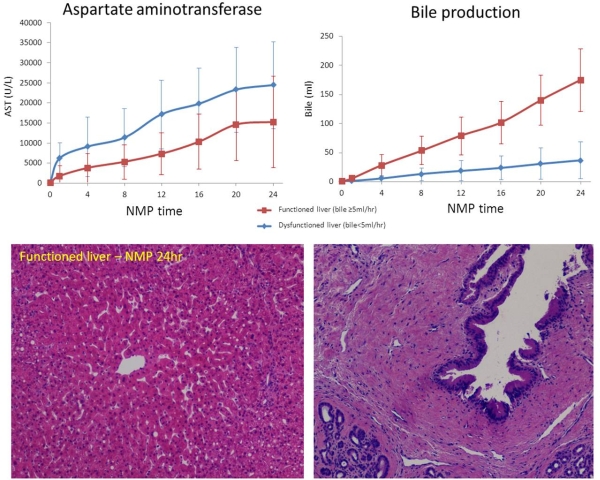Normothermic Machine Perfusion (NMP) on Discarded Human Livers: The First Model in the US
Cleveland Clinic, Cleveland, OH.
Meeting: 2015 American Transplant Congress
Abstract number: 117
Keywords: Graft function, Liver preservation, Machine preservation, Safety
Session Information
Session Name: Concurrent Session: Liver Transplant Rejection: Animal Models
Session Type: Concurrent Session
Date: Sunday, May 3, 2015
Session Time: 4:00pm-5:30pm
 Presentation Time: 5:12pm-5:24pm
Presentation Time: 5:12pm-5:24pm
Location: Room 121-AB
The benefit of NMP preservation has been reported in a number of animal studies. Herein we describe safety, feasibility and effectiveness of NMP on discarded human livers as the first center in the nation. Ten human livers were discarded due to steatosis, prolonged warm ischemia, fibrosis, or a combination of these factors. All livers underwent 24hrs NMP after 5-6hr of cold storage. NMP perfusate consisted of blood bank obtained matched human fresh frozen plasma and packed red blood cells (total volume 2.5L). All livers had stable physiologic hemodynamic parameters, showing consumption of oxygen and glucose, and decreasing lactate during NMP. Using bile production as a marker of organ function (≥ 5ml/hr), half of the grafts displayed good function, with lower aspartate aminotransferase release and good preservation of parenchymal architecture when compared to organs that did not produce bile (bile production :174±53ml vs 36±31ml; p=0.001; AST 15205±11392 U/L vs 24435±10841 U/L; p=0.23). No machine failure/malfunction was recorded. NMP preservation proved to be a safe and feasible technique on human livers, and showed the potential ability to rescue half of all discarded human livers based on viability assessment during perfusion.
No machine failure/malfunction was recorded. NMP preservation proved to be a safe and feasible technique on human livers, and showed the potential ability to rescue half of all discarded human livers based on viability assessment during perfusion.
To cite this abstract in AMA style:
Liu Q, Nassar A, Iuppa G, Urcuyo-Llanes D, Sexton D, Okamoto T, Uso T, Bennett A, Baldwin W, Abu-Elmagd K, Fung J, Miller C, Quintini C. Normothermic Machine Perfusion (NMP) on Discarded Human Livers: The First Model in the US [abstract]. Am J Transplant. 2015; 15 (suppl 3). https://atcmeetingabstracts.com/abstract/normothermic-machine-perfusion-nmp-on-discarded-human-livers-the-first-model-in-the-us/. Accessed February 17, 2026.« Back to 2015 American Transplant Congress
